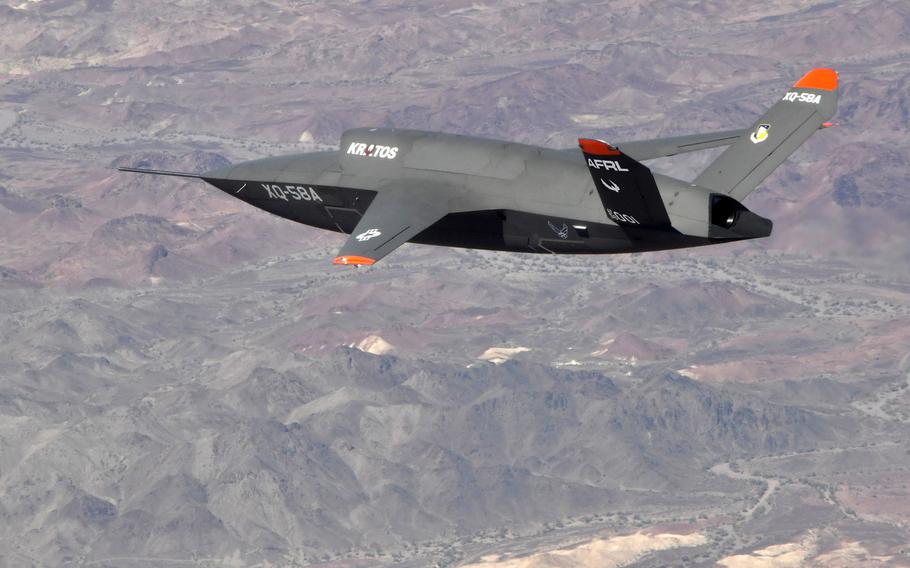
The XQ-58A Valkyrie demonstrator, a long-range, subsonic drone, conducts a 2019 flight. It's made by Kratos Unmanned Aerial Systems, one of the four companies picked to build the Air Force's Skyborg drone, the Air Force Life Cycle Management Center said on July 23, 2020. (Holly Jordan/Air Force Research Laboratory)
Four companies have been chosen to develop combat drones that will use artificial intelligence to either fully execute or support manned aircraft on “strenuous or dangerous” missions, the Air Force said.
Boeing, Northrop Grumman, General Atomics and Kratos Unmanned Aerial Systems were awarded contracts in support of the Air Force’s Skyborg Vanguard Program, the Air Force Life Cycle Management Center said in a statement Thursday. The companies will compete for up to $400 million in orders, it said.
The program name evokes the “cyborg” man-machine hybrids of science fiction, but also perhaps the fictional artificial intelligence network Skynet in the “Terminator” film series.
Will Roper, the Air Force’s assistant secretary for acquisition, technology and logistics, suggested a more endearing fictional creation, Defense News reported. At a conference last year, he likened it to the beep-booping droid R2-D2 of the “Star Wars” universe that helps Luke Skywalker and his father pilot their fighter spacecraft.
The real-world drones are supposed to include AI upgrades to allow them to “learn” how to engage enemy defense systems, as well as to share data with manned F-35 and F-15 fighters. This would allow the drones to operate in tandem with the jets in a “wingman” role, officials said.
“Because autonomous systems can support missions that are too strenuous or dangerous for manned crews, Skyborg can increase capability significantly and be a force multiplier,” Brig. Gen. Dale White, program executive officer for fighters and advanced aircraft, said in the statement. “We have the opportunity to transform our warfighting capabilities and change the way we fight and employ air power.”
The new drones, which will eventually replace the MQ-9 Reaper, will be designed to be “attritable,” meaning they will be inexpensive enough that losing one in combat would be tolerable.
The first Skyborg drones are expected to be operational by 2023. At least two models — a ground attack and an air superiority version — are expected to be fielded, according to Aviation Week & Space Technology.
The U.S. is not the only country developing stealthy combat drones, although it’s not clear whether any others are AI-enabled.
In October, China featured a prototype of the GJ-11 Sharp Sword drone at its national day parade. Russia, meanwhile, has released video of a much larger Sukhoi Su-70 drone flying in formation with an Su-35 fighter, indicating that the two are capable of operating in tandem.
And Israel has already used in Syria a stealth “loitering drone” that can crash into targets if it’s detected, or return to base if the strike is called off.